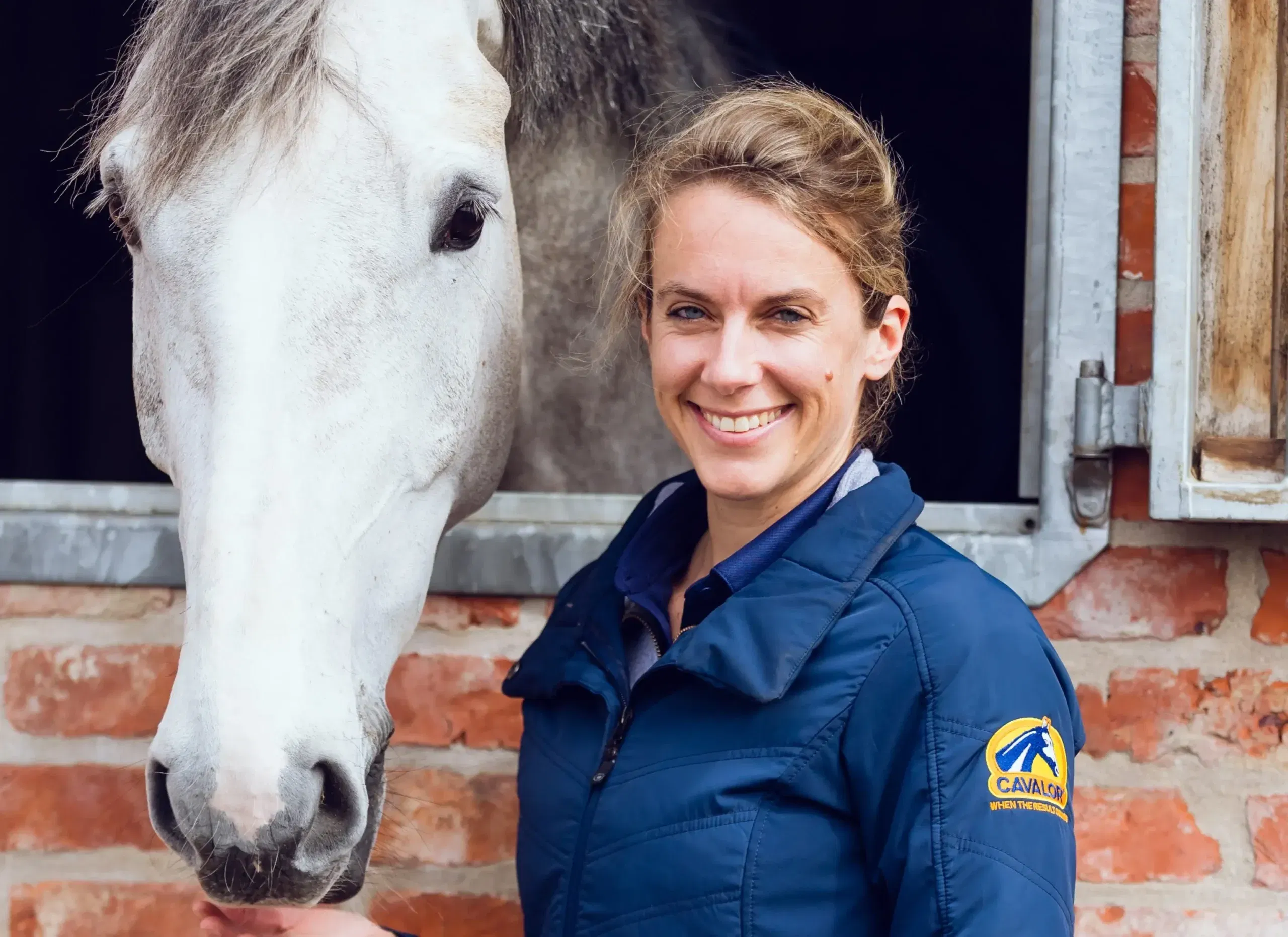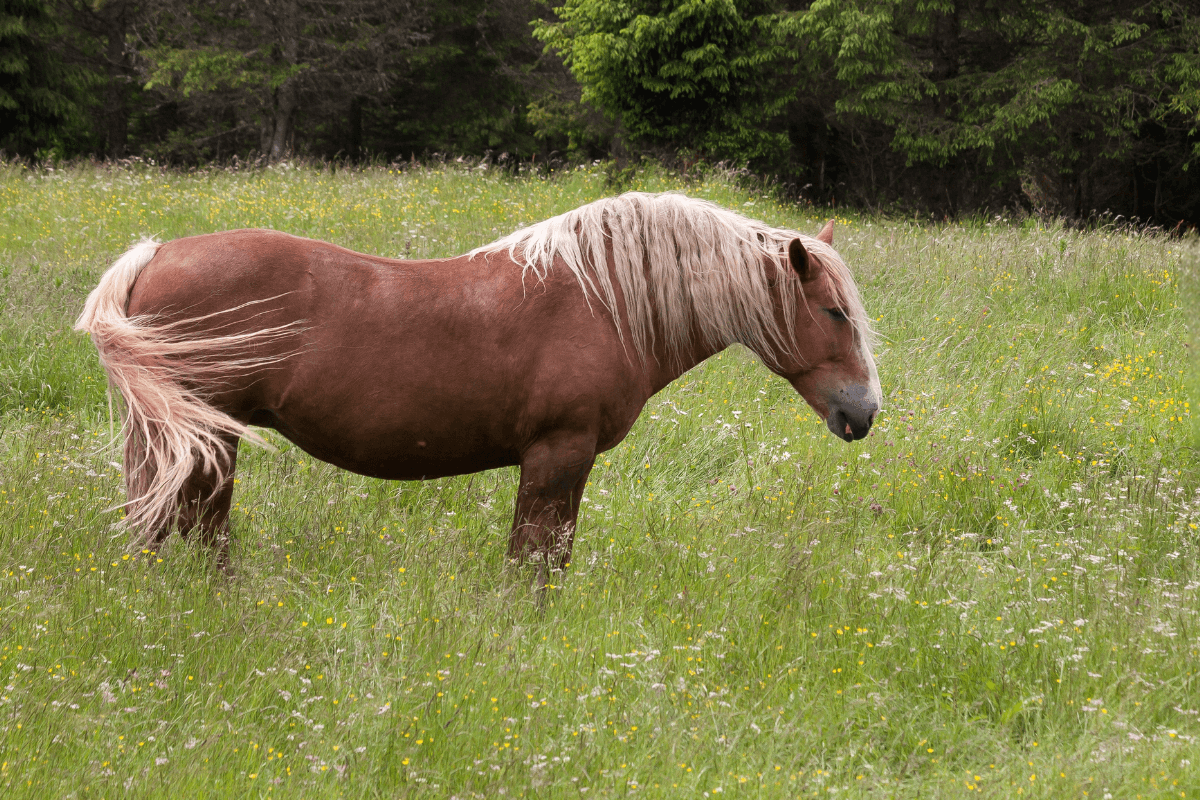Healthy hooves are essential for your horse. The horse carries its entire weight on those hooves, and in every discipline they are heavily taxed. A healthy hoof is elastic and reduces the ground reaction force that must be absorbed by the skeleton. They are literally the shock absorbers of a horse.
But what if the hooves are not functioning properly due to laminitis? This article explores this common problem in greater detail.
The word ‘laminitis’ suggests that it is just a hoof problem, but in most cases the cause lies deeper: an underlying metabolic disease or metabolic problem.
Recognisable symptoms are:
- stiff, rigid movements
- Abnormally warm hooves
- increased digital pulse
- A characteristic posture in which the horse leans back to relieve the front hooves (in a severe stage)
Inflammation of the lamellae
Lameness can have several different causes such as nutrition, colic, underlying diseases, infections, obesity and intestinal disorders. This often leads to metabolic disorders, increased inflammation levels and the release of toxic substances into the blood. These substances reduce blood circulation in the hoof and cause inflammation in the lamellae.
The lamellae are the connection between the coffin bone and the hoof wall. When inflamed, it creates swelling that causes a lot of pain. In severe cases, the lamellae can detach, causing the coffin bone to drop or rotate downwards. This deprives the coffin bone of support, causing it to tilt and the tip of the coffin bone then pushes against the sole. In very severe cases, the coffin bone can even penetrate the sole. A horse that has been laminitic once will always remain susceptible to the recurrence of the condition. This requires treatment that often has to be continued for a lifetime.
HEALTHY HOOF: Pastern bone, coronet bone, hoof wall, lamella, coffin bone, flexor tendon, navicular bone, digital cushion
LAMINITIC HOOF: Space created when the lamellae tear from the hoof wall, strong tendon pulse, strained flexor tendon, twisted coffin bone pressing on the sole
Causes of laminitis
Because the hoof contains many blood vessels, infections or metabolic abnormalities elsewhere in the body can also affect the hoof. That is why laminitis sometimes occurs during illness, colic, serious injuries or after foaling.
If the afterbirth is not delivered after six hours, it can cause severe inflammation in the uterus, releasing toxins into the blood that can cause laminitis. However, the most common causes are nutrition and metabolic diseases, such as obesity and insulin dysregulation.
Nutrition and laminitis
Often, laminitis is linked to the horse having eaten grass that is too rich or too much grain. Both contain a lot of fast-digesting sugars. In the case of grain, these sugars are normally enzymatically digested and absorbed in the small intestine. Sugars from grasses, also called fructans, are digested in the large intestine. The digestive process is initiated when eating (of any food). However, the small intestine has a limited capacity to digest sugars per meal. So, when a horse ingests too many sugars, undigested sugars can enter the colon. There they are quickly fermented into lactic acid. The same happens when an excess of fructan flows into the large intestine. The excessive production of lactic acid causes the pH level of the intestine to decrease, which disrupts the healthy microflora in the intestine. These intestinal disorders in turn cause the release of endotoxins (components of dead bacteria) and increased intestinal permeability. Once these endotoxins enter the bloodstream, they cause all kinds of immune and metabolic disorders. These disorders affect tissues throughout the body as well as the hoof where it can lead to laminitis
Watch our video about laminitis: How do you recognise it and how do you prevent it?
Metabolic diseases
Horses that suffer laminitis due to their rations are not necessarily overweight. However, horses with metabolic diseases often are. Obesity, for example, increases the risk of laminitis in two ways. On the one hand, horses have to continuously carry their (over)weight, putting extra pressure on the delicate connection between the coffin bone and hoof wall. On the other hand, fat is certainly not harmless tissue but is actually very active. Fat tissue plays an active role in various metabolic processes throughout the horse’s body. As a result, excess fat can lead to chronic inflammation, metabolic disorders and also insulin resistance in various tissues.
Laminitis: Prevention is better than cure
- Provide tailor-made nutrition
Laminitis can arise from (much) too high a level of sugar and starch. Balanced nutrition of good quality helps prevent laminitis, get advice from experts.
- Outdoor grazing is possible, but in moderation!
A horse that is prone to laminitis can go to pasture, but this should be regulated. Cordon off the pasture with tape so that your horse has a ‘new’ piece of grass every day and cannot overeat in the pasture. Note, sugar levels in the grass are often higher in early spring and late fall. During these risk periods, it is best to limit grazing for the sensitive horse. Avoid spring surprises – learn all about fructan in spring grass and how to deal with it. - Maintain a healthy weight
Horses and ponies that are overweight are more likely to develop laminitis. So keep a close eye on your horse’s weight. Did you know that you can easily calculate the weight of your horse without a scale? You can read all about the importance of a healthy weight in horses in our previous article.
- Ensure your horse gets enough exercise
Exercise is always important, but even more so for horses that are prone to laminitis. In laminitis, the blood circulation in the hoof is disrupted. Exercise ensures good blood circulation as well as improved lymphatic drainage, which helps to remove toxins.
Advice from our experts: Relieving both internally and externally
Does your horse still suffer from sensitive hooves? Always alert your vet! Additionally:
- Adjust nutrition and exercise
- Feed your horse roughage that is low in sugars. You can have this analysed or choose a less nutrient-rich, longer-stemmed hay.
- Avoid temporary concentrate and grazing, but make sure that your horse still gets enough protein, minerals and vitamins because these nutrients are important for a healthy metabolism. If necessary, replace the concentrate with a balancer or fibre-rich food low in sugars (e.g. Fiberforce).
- Make sure your horse can stand on a soft surface and encourage light movement (unless this makes the situation worse)
Support from within: Cavalor Laminaid
Sensitive hooves can be a result of a disturbed metabolism. Cavalor LaminAid can help with this. This supplement has been specially developed to quickly bring a disturbed metabolism throughout the body back into balance. Cavalor LaminAid is a real game changer for horses with sensitive hooves caused by metabolic problems. It supports the sensitive intestinal flora, balances hormonal and metabolic processes and supports circulation. Recent scientific research shows that horses with a disturbed metabolism become less sensitive after six weeks of LaminAid supplementation. Learn more about Cavalor LaminAid and its benefits for horses with sensitive hooves.
Outside support: Cavalor PodoSens
Cavalor PodoSens is a therapeutic hoof oil with essential oils that provides relief for sensitive and/or problem hooves. It reduces pressure, promotes elasticity and supports healthy hoof growth.
With the right nutrition, exercise and support, laminitis can be prevented and managed. Ask our experts for advice and ensure a good balance in your horse’s metabolism!


